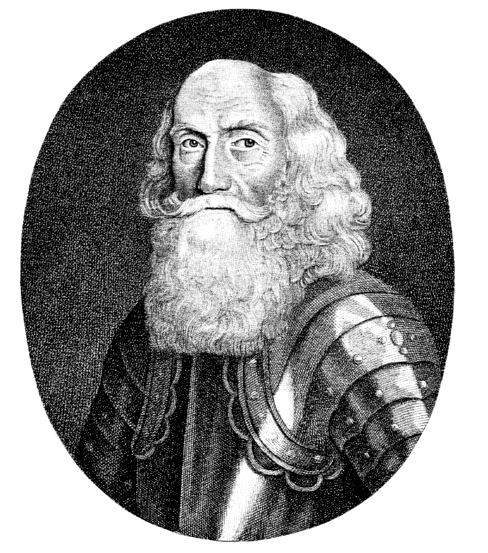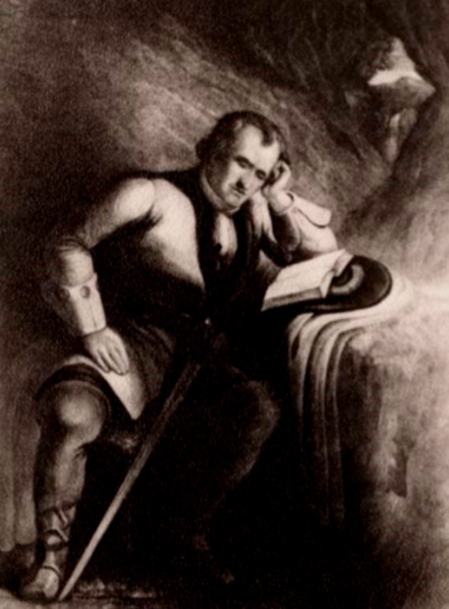The ‘Meeting of General Dalziel and Captain Paton of Meadowhead’ #History #Scotland #Poetry

In 1684, two veterans of the seventeenth-century European and British wars meet at the edge of Edinburgh. One is the commander of the army hunting the Covenanters, General Tam Dalyell of the Binns. The other, Captain John Paton of Meadowhead, a captive militant Covenanter destined for execution…

Paton of Meadowhead. Dalyell (Above)
This poem was published by the Reverend James Dodds of Dunbar in Lays of the Covenanters (1880), 240-45.
‘MEETING OF GENERAL DALZIEL AND CAPTAIN
JOHN PATON OF MEADOWHEAD,
When the Latter was brought Prisoner to Edinburgh, August, 1684.
Hath his good sword her temper lost,
Or her master now forsaken?
Or why, such wars and dangers passed,
Is he a captive taken?
Nay, nay! his arm is powerful yet,
His sword as keen as ever;
But he is life-worn, and would fain
That God should him deliver.
The same that won his maiden scars
At Lutzen, famed in story;
And since, in every hard campaign,
Hath shared the toil and glory.
But chiefly to his native land
His heart and sword were given;
That she might keep her ancient rights
And her covenant with heaven.
And still his frame is knit like brass,
Age passes gently o’er it,
As loath to touch the stately pile:
Alas! who shall restore it?
And still his adamantine step
Sounds like the charger prancing:
The troopers shrink as he looks round,
With eyes like an eagle’s glancing.
Oh, had he roused his ancient strength,
He’d given these kites to slaughter,
Until the swamps about Lochgoin
Had run with blood like water!
But death, familiar to his thoughts,
With no dark shadow haunts him;
And, strong and valiant in his mind,
No earthly suffering daunts him.
Nor his the merely brutal strength,
That like the whirlwind sweepeth,
But when his work and warfare end,
Calm as a dove he sleepeth.
And he surrenders patiently
To those who come to snare him:
When, fast as horses feet can tramp,
To Edinburgh town they bear him.
And now they skirt Corstorphine Hill,
With August blossoms merry:
When by the way Dalziel rides forth,
To see what spoils they carry.
His grizzled beard falls down his breast,
Like a knot of scorpions twisted;
His flinty brow with harshness scowls,
And violence unresisted.
Like fire from the blacksmith’s forge, his eye
Glares forth with lawless fury:
Woe worth the land, where such a man
Is general, judge, and jury!
Yet, albeit bred in savage deeds,
His heart’s blood all congealing,
One touch of kindness lingers there:
The true old soldier’s feeling.
When he beheld amid his band,
Old Paton wearily wending,
Unwonted pity lit his face,
A glow to his grey cheek lending.
Down from his coal-black steed he leaps,
The aged prisoner meeting,
And takes him kindly in his arms:
A right old veteran’s greeting.
“John! had we but sooner met,
These pinions had not bound thee;
But I shall sue, and ‘twill go hard
If pardon be not found thee.”
“Thy suit will be in vain: my life
Though scantly worth the taking,
Must go to feed an ancient feud,
Long years of vengeance slaking.
Thou, General, hast the soldier’s touch,
The soldier’s mind and mettle;
But I am in the bishop’s clutch,
Not on the field of battle.”
“What, sayst thou so? I’ll save thy life:
Or, if they dare refuse it,
I’ll fling my sword down in the mire,
For slaves that like to use it.”
‘Twas then a vile, obsequious groom
Came up his zeal to blazon:
“Ha, Paton! art thou caught at last,
Thou spawn of Whiggish treason?”
“Friend, stint thy speech! I’ve served the king,
More true and tried than thou art:
Time was my sword and life were pawns
For the royal House of Stuart.”
“True, my old comrade! thou wert first
Wherever duty called thee:
At Wor’ster, where the game was lost,
No dangers e’er appalled thee.
There for the king thy blood was shed,
Thy sword was fell and ready;
And in all changes thou hast been
A soldier tried and steady.
Let house-dogs whine and gnaw their bone,
Snug-kennelled from the weather;
Our jaws were set where the war-dogs met,
And we lapped red blood together.
Since then in hostile camps we’ve fought,
Each would have slain the other;
Yet now in thee I only see
A soldier and a brother!”
Then round he turned, all black in the face,
His beard as stiff as brambles,
And his staff came whack! on the varlet’s back,
Till he rolled like an ox in the shambles.
‘”Lie there, false loon! and cool thy tongue,
This noble foe decrying:
One whiff of his sword would send ten like thee
As summer-gnats a-flying!”
They parted, these two hoary chiefs:
Dalziel’s request was granted,
But treacherous fingers came between,
And the act of grace prevented.
Old Paton dies with a soldier’s heart,
With a martyr’s high devotion;
Rests from his labours and his woes,
From war and wild commotion.
Dalziel lives on: this one bright act
His dark career to chequer,
As the stormy sky one ray darts forth,
Then thicker glooms and thicker.
Guilt sears his conscience: festering lust
His dotard heart debases:
Till, at the sumptuous banquet set,
While splendour round him blazes,
In a moment dead he falls like lead,
As the wine to his lip he raises!’
For more literature inspired by the Covenanters of the 1680s, see here.


[…] The ‘Meeting of General Dalziel and Captain Paton of Meadowhead’ […]
The ‘Meeting of General Dalziel and Captain Paton of Meadowhead’ | Literary Corstorphine said this on March 31, 2017 at 5:26 pm |